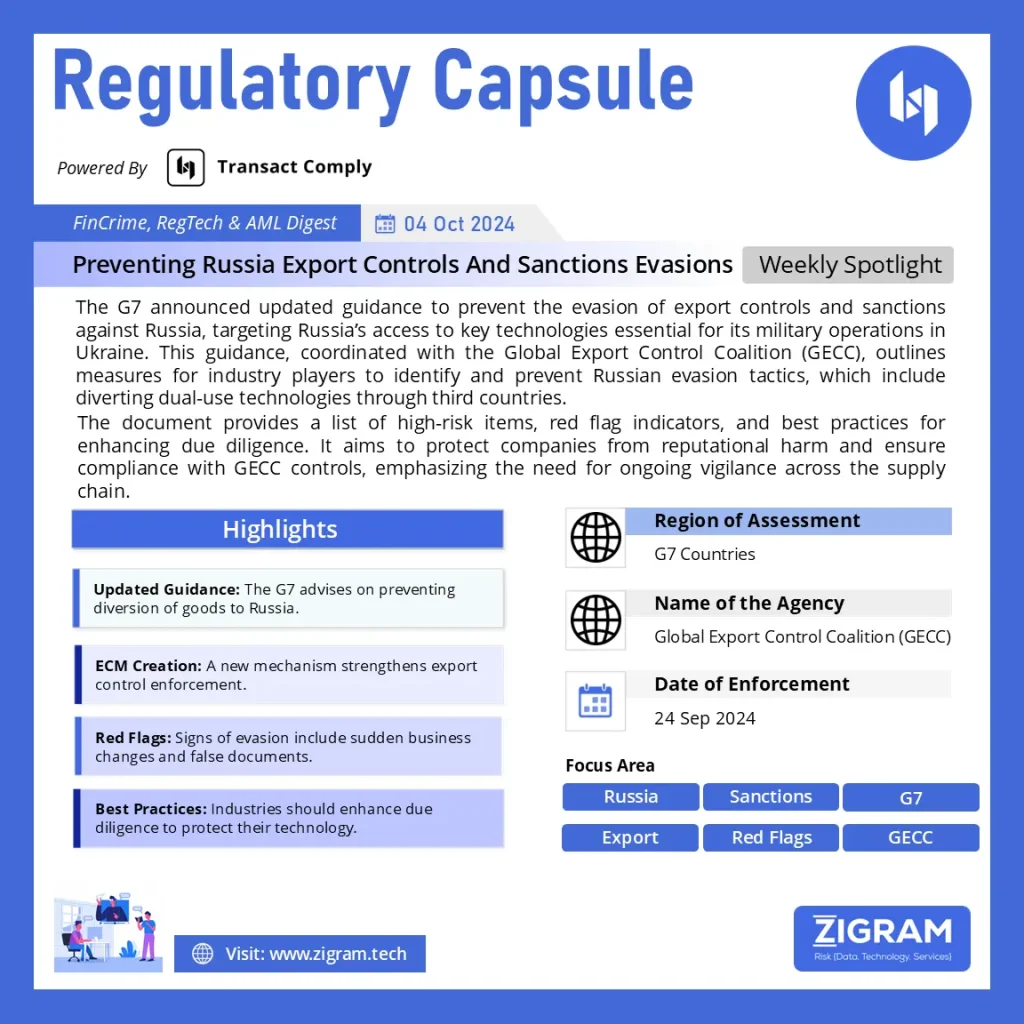Regulation Name: G7 Guidance To Prevent Evasion Of Russia Export Controls And Sanctions
Publishing Date: 24 Sep 2024
Region: G7 Countries
Agency: Global Export Control Coalition (GECC)
The Group of 7 (G7)—comprising Canada, France, Germany, Italy, Japan, the UK, the US, and the European Union—has released updated guidance to prevent Russia from evading export controls and sanctions that have been in place since February 2022. These measures, coordinated with the Global Export Control Coalition (GECC), aim to restrict Russia’s access to key technologies that support its military operations in Ukraine.
Coordinated Efforts Against Russia
Since Russia’s invasion of Ukraine, the G7 has imposed unprecedented sanctions and export controls to degrade Russia’s military capabilities and economy. The sanctions primarily target goods and technologies that Russia needs to maintain and develop its weaponry. The G7’s coordinated efforts, alongside GECC, which includes 39 member nations, have limited Russia’s access to crucial markets and resources.
To bolster compliance, the G7 established the Enforcement Coordination Mechanism (ECM) in February 2023. The ECM enhances enforcement of multilateral sanctions and export controls. In September 2023, the ECM created a Sub-Working Group on Export Control Enforcement, facilitating the exchange of information, best practices, and trends among G7 members to further restrict Russia’s access to critical technologies.
Red Flag Indicators And High-Risk Items
The G7 guidance identifies red flags that industries should monitor to prevent potential evasion of sanctions. These include sudden changes in business activities, false documentation, and efforts to conceal the end-user of controlled items. Companies are urged to exercise caution, especially with businesses that were previously exporting to Russia but shifted their operations to third countries after February 2022.
The Common High Priority List (CHPL) is a central part of the guidance, identifying items at high risk of diversion to Russia. These include critical electronics, microelectronics, and manufacturing equipment that Russia needs to sustain its military production. CHPL items are prioritized for enhanced due diligence, as these goods have been found in Russian weapons or identified as crucial to Moscow’s war efforts. The G7 urges exporters to monitor these items closely and screen them against sanctioned entities and high-risk countries.
Russia’s Evasion Tactics
Despite the strict sanctions, Russia has employed deceptive tactics to evade export controls. These include the use of transshipment agents, shell companies, and third-country intermediaries to divert restricted technologies to its military. Russia has also legalized parallel imports, allowing Russian businesses to obtain foreign intellectual property without consent, effectively bypassing international regulations.
The Russian government has supported these procurement efforts through legal measures, such as Decree No. 302, which allows the state to seize foreign-owned assets, and Decree No. 250, which grants Russian authorities access to sensitive information held by foreign companies. These actions complicate compliance efforts and increase the risk of Russia gaining unauthorized access to advanced technologies.
Best Practices For Industry
To counter these risks, the G7 recommends industries adopt best practices that strengthen their export compliance systems. This includes conducting thorough due diligence, especially when encountering red flags. Companies should verify the legitimacy of transactions, investigate suspicious customer information, and ensure that all parties in the supply chain are compliant with export controls.
Industries are also encouraged to update their distributor agreements, requiring partners to implement stricter due diligence measures. The G7 advises companies to avoid transactions that cannot clear red flags and to report suspicious activity to the relevant authorities.
The G7’s updated guidance reflects its ongoing commitment to preventing Russia from accessing technologies that support its war in Ukraine. By strengthening enforcement measures and encouraging industries to adopt enhanced due diligence, the G7 aims to close the loopholes Russia has exploited. This coordinated approach not only supports the integrity of global export controls but also reinforces the collective economic pressure on Moscow.
With these efforts, the G7 continues to degrade Russia’s ability to sustain its military operations, while ensuring that businesses remain compliant with international sanctions and export control regulations.
Read the details here.
Read about the product: Transact Comply
Empower your organization with ZIGRAM’s integrated RegTech solutions – Book a Demo
- #G7
- #ExportControls
- #Sanctions
- #RussiaSanctions
- #UkraineCrisis
- #GlobalTrade
- #Compliance
- #SupplyChainSecurity
- #IndustryGuidance
- #TechnologyExport
- #InternationalRelations
